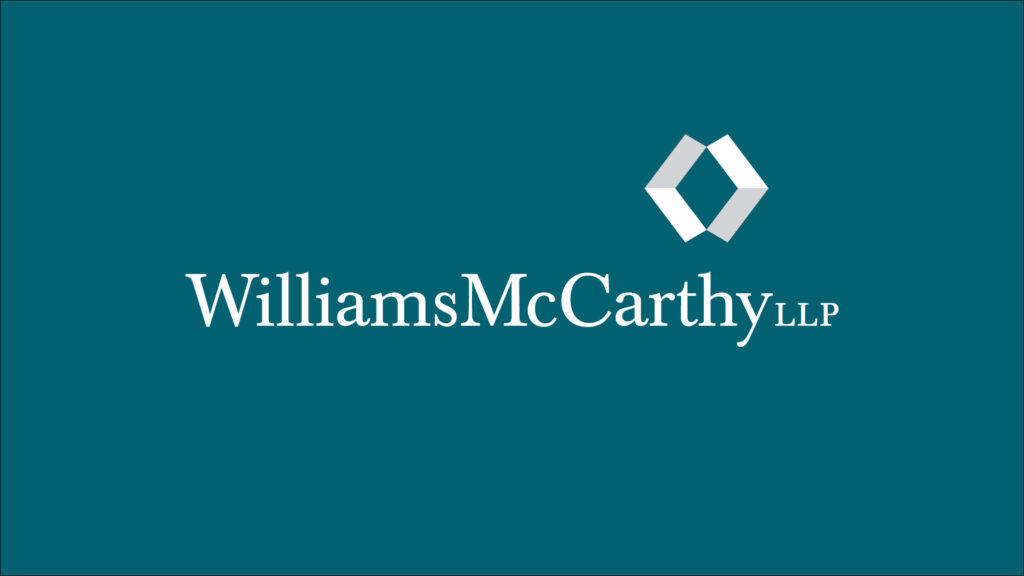
In the Spotlight with Carol Hartline
Learn more about partner Carol Hartline in this “In the Spotlight” feature.

Our intellectual property attorneys work with the firm’s other practice groups to provide advice and conduct due diligence in support of business transactions featuring the sale, license or transfer of intellectual property. Facilitated by a strong culture of teamwork, WilliamsMcCarthy LLP intellectual property lawyers often draw on the expertise of the firm’s other practice specialties to achieve the client’s objectives quickly and cost-effectively.
Trademark Registration and Enforcement
Trademarks are an essential part of any business. They embody your brand and your reputation. They help people tell the difference between the products and services your business offers and the products and services of others. Here are a few things every business owner should know about trademarks.
What is a trademark?
A trademark is any word, slogan, symbol, design, or combination of these things, that identifies the source of your goods and services and distinguishes them from the goods and services of another. A trademark is essentially a brand for goods and services.
Consider for example, Coca-Cola® and Pepsi®. When you see each mark on a bottle, you immediately know the source of each beverage. The mark on the bottle prevents you from grabbing a Coke® when you really want a Pepsi® and vice versa. The name Coca-Cola® is a trademark in itself, but when displayed in a logo, the wording in that stylized form is also a separate trademark.
A trademark can be a word, slogan, symbol, design, or combination of these things, as well as a sound (think of the MGMtm lion’s roar), a color (think UPS® brown), or even a smell (like PLAY-DOH’s scent). Pretty much anything can be a trademark or service mark, so long as it identifies the source of goods and services and distinguishes them from the goods and services of others.
How is a trademark different from a patent or a copyright?
A trademark is essentially a brand for goods and services. A patent protects inventions. A copyright protects original artistic and literary works, like songs, movies, books and blueprints. To illustrate the differences, let’s say you invented a new appliance. You might apply for a patent for the invention itself. You might also apply for a trademark for the brand name used on the appliance. Finally, you might want to register a copyright for the TV commercial or catchy jingle used to market the product.
Trademarks (for brands), patents (for inventions) and copyrights (for original artistic works) are three different types of protection for a category of rights known as “intellectual property” rights.
Are domain names (web addresses) trademarks?
A web address (like www.wilmac.com for example) is called a domain name. Having a registered domain name for your company’s website does not necessarily mean you have trademark rights in that web address. In fact, if you register a domain name that includes the trademark of another party, you may have to surrender that domain name. So, a domain name registration does not equal a trademark registration.
A domain name may function as a trademark, so long as it is used in a way that it identifies the source of particular goods and services. For example, AMAZON.COM is used as a web address and it is also registered as a mark for an online retail store.
Are registered business names trademarks?
A business name is simply the name under which you do business in a particular state or jurisdiction. A business name registration with your state does not grant you trademark rights. It merely means that a particular state allows you
to do business under that name. Of course, a business name can be a trademark, if it is used to identify the source of your goods and services and distinguish them from the goods and services of another.
How do I protect my trademark?
To enjoy the nationwide rights offered by a federal trademark registration, you must file an application and receive a registration from the United States Patent and Trademark Office (“USPTO”). Individual states also offer to register trademarks, but any protection granted by those marks is limited to the state that issued the registration.
Picking a trademark and registering it can be a daunting task. While plenty of companies and individuals register their own trademarks, working with an attorney to guide you through the process is highly recommended. Simple registrations with the USPTO typically cost around $1,200, inclusive of USPTO and attorney’s fees.
If you have any questions or would like to request more information, please contact us.
We regularly share insight in publications and our quarterly e-newsletter, Comments from Counsel.

Learn more about partner Carol Hartline in this “In the Spotlight” feature.

Four WilliamsMcCarthy LLP partners were selected by their peers for inclusion in the 2025 Illinois Super Lawyers list.

Stay up-to-date with the latest legal insights from WilliamsMcCarthy LLP. Check out the August 2024 edition of Comments from Counsel, the firm’s quarterly newsletter.

In 2024, businesses saw an onslaught of new employment laws affecting Illinois employers. If you thought you could take a breather for 2025, you were wrong. Here are some of the new laws on the horizon.
120 West State Street, 4th floor
Rockford, IL 61101
P.O. Box 219
Rockford, Illinois 61105-0219
(815) 987-8900
anicholson@wilmac.com